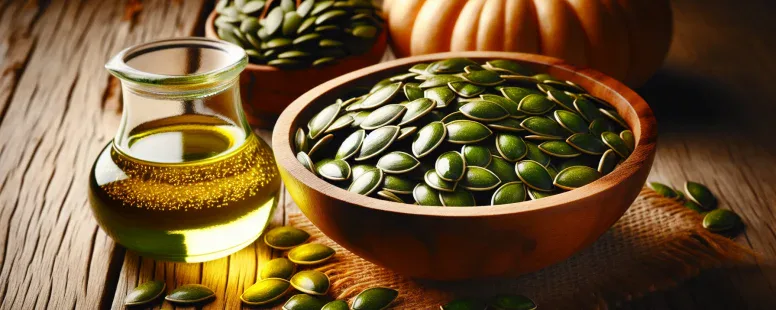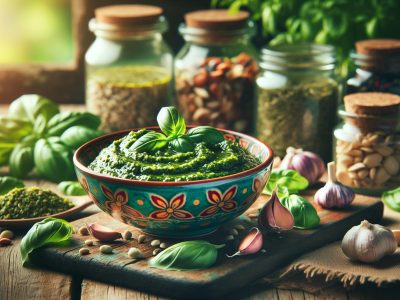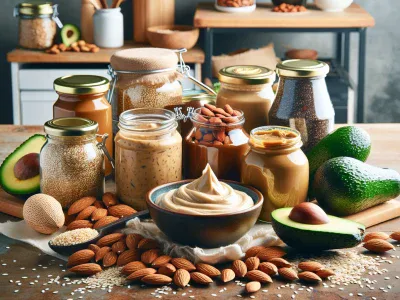Which Is Better: Pumpkin Seeds or Pumpkin Seed Oil? Nutrition, Benefits & Uses Compared
Picture cracking open a handful of roasted pumpkin seeds—the satisfying crunch releasing a nutty aroma that fills your senses. Now picture drizzling rich, emerald-green pumpkin seed oil over a fresh salad, its earthy flavor adding depth and warmth. Both come from the same source but offer very different experiences and benefits. Which one deserves a spot in your kitchen and wellness routine?
Choosing between pumpkin seeds and pumpkin seed oil isn’t just about taste. It’s a journey into nutrition, versatility, and how each can boost your health in unique ways. Whether you’re after a crunchy snack packed with fiber or a nutrient-dense oil to elevate your dishes, understanding their differences helps you make the best choice for your lifestyle and goals. Let’s explore what sets these two apart and discover which one truly shines.
Nutritional Comparison Between Pumpkin Seeds and Pumpkin Seed Oil
You understand that pumpkin seeds and pumpkin seed oil bring distinct nutrients to the table. Knowing the key nutritional differences helps you decide which suits your dietary needs best.
Key Nutrients in Pumpkin Seeds
Rich in protein, fiber, and minerals, pumpkin seeds offer a robust nutritional profile. They contain approximately 30 grams of protein and about 18 grams of fiber per 100 grams, contributing to satiety and digestive health. Zinc, magnesium, and iron stand out as major minerals supporting immune function, muscle health, and oxygen transport. For example, one ounce (28 grams) of roasted pumpkin seeds provides nearly 2.2 mg of zinc, which covers 20% of the recommended daily intake. The presence of antioxidants such as vitamin E and carotenoids further enhances their health benefits. You might wonder, but, how practical it is to consume these seeds daily—consider adding a small handful to your salads or oatmeal for an easy boost.
Essential Components of Pumpkin Seed Oil
Pumpkin seed oil, by contrast, concentrates healthy fats and fat-soluble vitamins while lacking fiber and protein. It is particularly rich in omega-6 and omega-9 fatty acids, with linoleic acid making up around 50-65% of its fatty acid profile. This composition supports cardiovascular health by potentially reducing LDL cholesterol levels. Phytosterols present in the oil also have cholesterol-lowering effects, making it a heart-friendly option. Also, pumpkin seed oil contains vitamin E in substantial amounts, acting as a powerful antioxidant. When you drizzle it over dishes or use it as a supplement, you harness these benefits without additional calories from proteins or carbs. If you were to rely solely on the oil, but, you’d miss out on the fiber and minerals inherent in whole seeds.
Below is a comparative table summarizing the primary nutrients and components in 100 grams of each product:
| Nutrient/Component | Pumpkin Seeds (100g) | Pumpkin Seed Oil (100g) |
|---|---|---|
| Protein | ~30 g | 0 g |
| Fiber | ~18 g | 0 g |
| Total Fat | ~49 g | ~100 g |
| Omega-6 Fatty Acids | ~15 g | ~50-65 g |
| Omega-9 Fatty Acids | ~10 g | ~30-40 g |
| Zinc | ~7.8 mg | Trace amounts |
| Magnesium | ~262 mg | Trace amounts |
| Iron | ~8.8 mg | Trace amounts |
| Vitamin E | ~1.9 mg | ~20-30 mg |
| Phytosterols | Present | High |
Choosing between pumpkin seeds or pumpkin seed oil depends on whether you prioritize whole-food nutrients like protein and fiber, or concentrated healthy fats and antioxidants. Mixing both in your diet diversifies your nutrient intake and leverages the best of these pumpkin-derived foods. Would you incorporate both forms into your meals or focus on one based on your wellness goals?
Health Benefits of Pumpkin Seeds vs. Pumpkin Seed Oil
You may wonder which option offers greater health benefits: pumpkin seeds or pumpkin seed oil. Both products deliver distinct advantages tied to their nutrient profiles and how your body processes them.
Benefits of Consuming Pumpkin Seeds
Pumpkin seeds pack a powerful punch of protein, fiber, and essential minerals, such as zinc, magnesium, and iron. You find these whole seeds especially effective for supporting digestion and keeping you full longer, thanks to their high fiber content. Picture munching on a handful after lunch; this simple habit boosts satiety and balances blood sugar levels more steadily. Also, zinc in pumpkin seeds enhances your immune system, making you more resilient against infections. , studies from the National Institutes of Health indicate that zinc plays a crucial role in immune modulation. But it’s not just nutrients; the crunch and texture make pumpkin seeds a versatile snack or salad topping, integrating nutrition with enjoyment. You might consider roasting them with a touch of garlic powder or chili for added flavor and antioxidants. While pumpkin seeds offer these benefits, they may contain phytic acid, which can slightly impair mineral absorption, so balancing intake is wise.
Advantages of Using Pumpkin Seed Oil
Pumpkin seed oil concentrates heart-healthy fats, including omega-6 and omega-9 fatty acids, that promote cardiovascular wellness by improving cholesterol profiles. When you drizzle this deep green oil over salads or soups, you supply your body with fat-soluble vitamins E and K, vital for skin health and blood clotting. Think of pumpkin seed oil as a nutritional ambassador delivering concentrated fats that your cells readily absorb, fueling cellular repair and reducing inflammation. Research published in the Journal of Medicinal Food highlights pumpkin seed oil’s potential in lowering blood pressure and alleviating symptoms of benign prostatic hyperplasia, showing functional benefits beyond basic nutrition. But, unlike the whole seed, oil lacks protein and fiber, so it can’t replace the comprehensive nourishment pumpkin seeds provide. Consider using pumpkin seed oil as a finishing touch rather than a cooking base, since heating it may degrade sensitive nutrients.
| Nutrient/Benefit | Pumpkin Seeds | Pumpkin Seed Oil |
|---|---|---|
| Protein | High (19g per 100g) | None |
| Fiber | High (5g per 100g) | None |
| Zinc | High (7.8mg per 100g) | Trace amounts |
| Magnesium | High (262mg per 100g) | Trace amounts |
| Omega-6 Fatty Acids | Moderate | High (54g per 100g) |
| Omega-9 Fatty Acids | Moderate | High (33g per 100g) |
| Vitamin E | Moderate | High |
| Satiety | Promotes fullness | No satiety effect |
| Culinary Uses | Snacks, baking, salads | Salad dressings, finishing oil |
You might explore including both pumpkin seeds and pumpkin seed oil in your meals to harness whole-food benefits alongside concentrated fats. Ask yourself whether you prioritize texture and protein or enhanced intake of essential fatty acids. Evaluating your dietary goals helps determine your best choice.
Will you snack on roasted pumpkin seeds to empower your immune system and digestion, or drizzle pumpkin seed oil to boost heart health and skin vitality? Both forms complement each other in a balanced diet, creating a symphony of flavors and health gains worth savoring.
Culinary Uses and Flavor Profiles
Understanding how pumpkin seeds and pumpkin seed oil differ in culinary applications helps you decide which fits best in your kitchen and palate. Their distinct flavors and textures shape their roles in various recipes and meal enhancements.
How to Use Pumpkin Seeds in Recipes
Pumpkin seeds bring a satisfying crunch and nutty flavor to meals. You can toss toasted pumpkin seeds onto salads, soups, or oatmeal for added texture and nutritional boost. Snack bowls with roasted pumpkin seeds, sea salt, and a hint of chili powder turn out irresistibly flavorful. Baking them into bread or muffins infuses a subtle earthiness and makes your goods visually appealing.
You might find pumpkin seeds ideal for making pesto when blended with basil, garlic, and olive oil, substituting pine nuts with a heartier twist. Some chefs use them as a crust for chicken or fish to introduce a crunchy layer that locks moisture inside. Wonder how they enhance desserts? Sprinkle pumpkin seeds over yogurt and honey for energy-packed breakfasts or desserts.
Cooking and Dressing with Pumpkin Seed Oil
Pumpkin seed oil’s rich, deep green color signals its intense, slightly nutty taste, which adds depth to dishes without overpowering. It’s delicate and best used as a finishing oil, drizzled over roasted vegetables, grilled meats, or pasta to elevate flavor and appearance. Heating it diminishes nutrients and alters taste, so avoid cooking with it on high heat.
Consider mixing pumpkin seed oil into vinaigrettes, combining it with balsamic vinegar and mustard to create robust dressings that awaken your salads. It pairs beautifully with creamy soups, where a teaspoon on top adds a contrasting warm note and vibrant color. Some Eastern European desserts incorporate pumpkin seed oil for its unique taste and antioxidant properties.
Both pumpkin seeds and pumpkin seed oil enrich your culinary repertoire. If you prefer adding texture and fiber, seeds suffice; when aiming for flavor complexity and healthy fats, the oil shines. Including both broadens your palate and nutrient intake, making meals more interesting and healthful.
Considerations for Choosing Between Pumpkin Seeds and Pumpkin Seed Oil
You face distinct choices when choosing between pumpkin seeds and pumpkin seed oil, each offering unique benefits based on your needs and lifestyle. Evaluating dietary preferences and restrictions alongside storage and shelf life helps you decide which fits best into your routine.
Dietary Preferences and Restrictions
Your dietary needs heavily influence whether roasted pumpkin seeds or pumpkin seed oil fits better into your meals. Pumpkin seeds contain significant protein and fiber, making them ideal if you seek to increase satiety or support digestion. Picture crunchy seeds sprinkled over a salad or mixed into oatmeal, adding texture while boosting essential minerals like zinc and magnesium—important for immune health and energy metabolism. If you avoid certain allergies or follow low-fat diets, whole seeds may pose challenges due to their fat content, whereas pumpkin seed oil concentrates heart-healthy fats—mostly omega-6 and omega-9 fatty acids—supporting cardiovascular health but lacking fiber and protein. Vegetarians and vegans benefit from seeds’ plant-based protein, whereas those monitoring calorie intake might prefer oil in small quantities for flavor without bulk. Besides, people with digestive sensitivities sometimes find whole seeds harder to tolerate, making oil a smoother alternative. Exploring your body’s response, you may want to rotate between the two or combine them to maximize nutritional gains.
Storage and Shelf Life
Your decision also depends on how you store and use these products over time. Pumpkin seeds, when roasted and kept in airtight containers, maintain freshness for up to six months in cool, dry places. Conversely, pumpkin seed oil requires more careful handling due to its susceptibility to oxidation. Exposure to light, heat, or air causes rancidity, shortening shelf life to about 3-6 months once opened, especially if not refrigerated. Unlike seeds, oil’s delicate nature demands vigilant storage in dark bottles away from heat to preserve nutritional integrity and flavor. If you buy in bulk or rarely cook with pumpkin seed oil, spoilage risk grows, so consider your consumption habits. You may find pumpkin seeds more forgiving for long-term pantry storage, while oil works better as a fresh finishing ingredient to avoid waste. Keeping this in mind supports smarter purchasing and usage decisions that prevent loss of nutrients and money.
When weighing pumpkin seeds against pumpkin seed oil, reflect on your lifestyle — if convenience and crunch are priorities, seeds enrich snacks and dishes over days. If you crave richness and subtle flavor with cardiovascular perks, oil offers potent benefits in measured doses. Both add valuable dimensions to your diet, but knowing your body’s responses and storage conditions streamlines your choice, empowering you to enjoy pumpkin’s nutritional gifts fully.
Which Is Better: Pumpkin Seeds or Pumpkin Seed Oil?
Choosing between pumpkin seeds and pumpkin seed oil depends largely on your nutritional priorities and culinary preferences. Pumpkin seeds, often enjoyed roasted or raw, provide substantial protein, fiber, and minerals like zinc and magnesium that support digestion and immune function. For example, a handful of roasted pumpkin seeds offers about 7 grams of protein and 1.1 grams of fiber, making them a satisfying snack that keeps hunger at bay. On the other hand, pumpkin seed oil contains concentrated healthy fats such as omega-6 and omega-9 fatty acids and vitamins E and K, which enhance cardiovascular health and skin vitality. But, since the oil lacks protein and fiber, relying solely on it omits key nutrients present in the whole seeds.
Consider your meals and eating habits when making this choice. If you crave a crunch in your salads or soups, pumpkin seeds add texture and a nutty flavor that pumpkin seed oil cannot replicate. Conversely, drizzling pumpkin seed oil over dishes imparts a rich, earthy taste that elevates flavors without overwhelming them—ideal for finishing touches in cooking. For instance, pumpkin seed oil pairs well with roasted vegetables and grain bowls, while seeds sprinkle perfectly over yogurt or oatmeal.
Storage and shelf life also influence which is better for you. Pumpkin seeds maintain freshness for months if stored in a cool, dry place, making them convenient for snacking or cooking. Pumpkin seed oil, exposed to heat and light, risks rancidity faster and demands refrigeration and airtight storage to preserve its delicate fats and nutrients.
Eventually, think about your health goals. If improving digestion and boosting protein intake tops your list, pumpkin seeds suit your needs well. If supporting heart health and enjoying antioxidant-rich oils appeals more, pumpkin seed oil fits the bill. You can blend both into your diet for diverse nutrients and flavor—adding seeds to your trail mix and using the oil for dressings, for example.
Have you experimented by combining both in a meal to catch the best of each? Tasting them side by side might help determine your favorite role for pumpkin’s versatile gifts.
Conclusion
Choosing between pumpkin seeds and pumpkin seed oil depends on what your body needs and how you like to enjoy your food. If you want a nutrient-dense snack that boosts protein and fiber, pumpkin seeds are a solid pick. On the other hand, if you’re aiming to support heart health with concentrated healthy fats, pumpkin seed oil fits the bill.
You don’t have to pick just one. Incorporating both into your diet can offer a wider range of nutrients and flavors. Experiment with adding seeds for crunch and oil for richness to find the perfect balance that suits your taste and wellness goals.
- Key Differences Between Nucleus and Nucleolus: Structure and Function Explained - October 31, 2025
- Unraveling the Differences: Buddhism vs. Hinduism Explored - October 31, 2025
- Understanding the Difference Between Kcal and Cal: A Guide for Better Diet Choices - October 31, 2025







